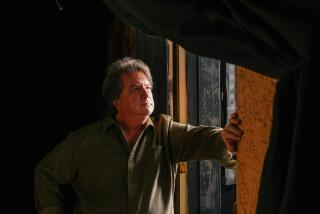Aboriginal nightmare in ‘Dreamtime’
- Share via
The enormity of the tragedy inflicted on Australia’s Aborigines during the early 20th century hits home with stunning impact in “Daisy in the Dreamtime,” the final installment in the 2003-04 Hot Properties series at the Ford Amphitheatre’s indoor space.
Under Simon Levy’s savvy direction, this Fountain Theatre production infuses history with visceral urgency in Lynne Kaufman’s cautionary drama based on the true story of Daisy Mae Bates. A feisty Irishwoman who abandoned her family (and all the creature comforts of civilization), Bates spent 30-plus years living in a tent among the Aborigines, gaining their trust and trying to shield them from the corrosive influence of progress.
As Daisy, the riveting Lisa Pelikan evokes a complex, finely nuanced portrait of the amateur anthropologist-turned-crusader who roamed the punishing outback in her prim Edwardian garb. Daisy’s uncompromising resolve is depicted in both her steadfast loyalty to a local tribesman, ironically named King Billy (Anthony J. Haney), and her steely opposition to a missionary (Suanne Spoke) who is bent on converting the Aborigines to more socially respectable behavior.
Although celebrating Bates’ life is one of Kaufman’s principal goals, the personal history that led her to the outback is saddled with the fragmentary dialogue and exposition that too many modern plays use in place of fully developed characters hashing things out.
Pelikan and the supporting cast (Lance Guest, Jay Bell and Eve Brenner) consistently impress with their ability to work with one- or two-sentence snippets. It’s Haney’s masterful turn as King Billy, however, that supplies the show’s heart and soul. A gregarious bear of a man who embraces her as the “Great White Queen of the Never-Never,” the homeless Billy is a paradox by civilized standards. “A child -- but a wise child,” Daisy calls him, as he pokes fun at the Western culture of “Thou shalt not,” and initiates her into Aboriginal “Dreamtime” (the archetypal, extra-temporal reality at the root of all things).
Through evocative lighting, scenic design and the eerie didgeridoo music played by Andrju Werderitsch, Levy makes this a felt world rather than an intellectual concept, which makes the Aborigines’ fate all the more poignant.
Despite Daisy’s best efforts, she failed to prevent the corruption of her adopted people, and Pelikan illuminates the full depths of her rage, passion and not-inconsiderable hubris. At a government conference, her plea for funding to create a protected reservation for Aborigines aches not only with concern for them, but also with her naive delusion that their welfare would be a self-evident priority for her audience.
Daisy faced a hard lesson in cultural arrogance, to be sure, but we can take solace in the fact that the near extinction of a noble indigenous population is a travesty that could only occur on some other remote continent.
*
‘Daisy in the Dreamtime’
Where: Fountain Theatre at [Inside] the Ford, 2580 Cahuenga Blvd. East, Hollywood
When: Thursdays through Saturdays, 8 p.m.; Sundays, 2 p.m.
Ends: April 25
Price: $25
Contact: (323) 461-3673 or www.fordamphitheatre.org
Running time: 2 hours, 10 minutes
More to Read
The biggest entertainment stories
Get our big stories about Hollywood, film, television, music, arts, culture and more right in your inbox as soon as they publish.
You may occasionally receive promotional content from the Los Angeles Times.










